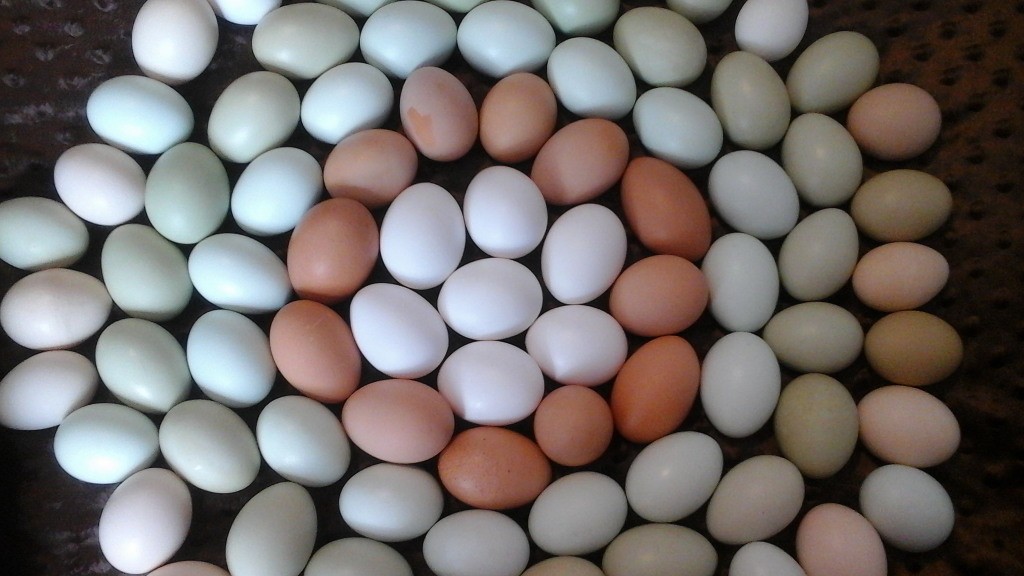
Photo by Sharon Kristoff
What’s the best way to clean dirty eggs? Should they be washed when you first gather them, or is it better to wait and wash them just before use? Before we answer these questions, let’s go over some basics.
Bloom Protects the Contents
A nearly invisible waxy substance called “bloom,” or “cuticle,” covers the surface of each freshly laid egg. Egg shells are porous, each shell having thousands of tiny pores. Bloom seals up those pores, allowing the egg to breathe, which is important for eggs that are going to be hatched. Bloom also seals out contaminants and bacteria.
Washing an egg in water removes the bloom, which is the egg’s best defense against contamination. If you plan to use the eggs right away, washing them first is a good idea. But if you plan to store eggs for a few days and if they’re not excessively dirty, then it would be best to delay washing with water until just before you plan to use them.
Prevention Is Best Cure
The best way to have clean chicken eggs is to prevent them from getting dirty in the first place. That’s not always possible, but in another article, we give some tips on how to keep eggs clean.
“Dry Clean” the Eggs if Possible
For eggs that have only a little dirt or manure on the surface and that aren’t deeply soiled, you may be able to clean them without water by using a little sandpaper. 320 grit will work well. (Higher numbered grits, being smoother, tend to be harder to get the egg clean with, and lower numbered grits, being coarser, tend to be too aggressive and can easily scratch away the bloom.)
By gently sanding any dirty spots on the egg, you can remove dirt while leaving the bloom mostly intact.
Washing Your Eggs
Some eggs, however, are too dirty to “dry clean” with sandpaper. For those, you’ll need water and/or detergent. When washing eggs, it’s best to use water that is 10-20 degrees (F) warmer than the egg. The reason for this is that each egg contains a small air cell. When air is cooled, it shrinks, so if you were to wash the egg in water that’s colder than the egg, the air cell would start to shrink. As it shrank, it would create a bit of a vacuum inside the egg shell, and this vacuum could actually pull contaminants through the pores and into the egg.
Warm water reverses this, causing the air cell to expand, thus creating slight pressure inside the egg that helps to keep contaminants out.
For washing eggs, we offer several different products:
- Egg Wipes — These are soft, biodegradable wet wipes made for cleaning eggs. Just pull an egg wipe out of the container and thoroughly wipe down the eggs. Each wipe is good for cleaning about a dozen eggs, depending on how dirty they are.
- Egg Soap Concentrate — This is a concentrated powder that makes a chlorinated egg washing solution.
- All Natural Egg Cleanser — This all natural, chlorine-free, concentrated cleanser removes dirt, manure and unwanted bacteria from the eggs. One bottle of concentrate makes more than 60 gallons of wash water.
- Egg Washing Kit — If you’ve got a lot of eggs to wash, this egg washing kit will save you lots of time. It works together with an air compressor and can wash about 8 dozen eggs in 15 minutes or less.
Eggs Not to Eat
If you find an egg with a broken eggshell, it’s best to avoid using it for human consumption, since the crack can let in contaminants. If you have a dog or cat, you can cook up the egg and feed it to them instead. I would also recommend that you not eat eggs that have become so deeply soiled that the shell remains discolored even after the eggs have been washed thoroughly.
Other Tips on Cleaning Eggs
Do you have other tips on how to clean eggs? Or favorite approaches? Post a reply in the comments below this article.



We always used to clean the eggs with clean water. That’s all what we do.
If you just have to wash the eggs in muddy situations, once dried off, should you lightly coat them with something like olive oil or butter using a very thin coat? I have done this in the past and the eggshell just absorbs the oil and you don’t even know it is coated.
Thank you for your response.
I thoroughly enjoyed the comments from readers about laying hens. What I have to write might be repetitious. It is absolutely necessary for layers to consume 4 ounces of 16% specially prepared concentrate daily to get maximum egg production. Like our children who would rather eat candy and drink soda pop, hens will fill up on cracked corn before they eat their concentrate. You get best production raising hens in cages or confined in hen houses. But yolks are more yellow. If you allow hens to range free and eat insects and green plants their production might be less but yolks will be darker orange and people say they taste better.
According to Shaver Poultry Breeding Farms product, pullets should start laying at 18 weeks of age. If you have 100 pullets you should get five eggs a day the first week. By the 19th week you should get 22 eggs per day. I got my first eggs during the 19th week. Production will continue to increase until the 25th week when they should be laying at 94% or 94 eggs per day from 100 hens. They should maintain this rate through their 32nd week of age. At this point they start dropping off at 0.5% per week. By their 80th week they should be down to 70.0% production. Unless you are raising hens as a hobby you should keep production and cost records and when your hens are not paying for their feed and upkeep it is time to replace them.
In England in 1957 a Rhode Island Red hen set a Guiness world record laying 353 eggs in 365 days. I had hens, raised in cages, in Guatemala that probably laid 340 or more eggs in a year. Our days were just as long in the winter there as in the summer. Here in Oregon I have installed a fluorescent light in my hen house and in the winter have it set on a timer to come on at 0430 and stay on until 0730 in the morning and come on again at 6 p.m. and stay on until 10 p.m. at night. Murray McMurray hatcheries do sell a special breed of hen that maintains their egg production during the winter better than other birds like Rhode Island Reds or Plymouth Rocks. I ordered 13 of these birds my last purchase.
According to my teacher in Guatemala he said to get maximum production the same person must feed the same feed at the same time in the same sequence every day. Any deviation will upset your hens and they will wonder what they have done wrong.
I had always heard to put a bit of vinegar in your egg cleaning water. Is this OK?
If i slightly crack an egg while collecting, i don’t mind eating it. My boy and I usually just cook it up right away. It’s sort of a tradition we have. As far a food borne illness, it requires a bit of time (at least a few hours) for the broken egg to become a danger.
As far as washing them, I wouldn’t want to wash the eggs in something I wouldn’t want to put in my mouth (at least in a diluted form).
Thank you all so much for these tips. They have been so helpful, knowledgeable and wise. Makes my chicken experience so much better.
We wash our eggs in warm water and soap, air dry and then wipe them down with mineral oil.
What is they best way of keeping eggs clean to start with
Kathryn, please see this article:
7 Ways to Get Cleaner Eggs from Your Chickens
when I was a child my Mom used cracked eggs all the time. We never got sick. I use my cracked eggs still today and have no problems. I believe if you cook them good that all germs are killed.
So cracked eggs are not fit for human consumption but OK for the dog? I value my dog more than most folkes I guess! No broken shells for him, I cook his with mine every morning (he likes them scrambled).
A Friend of mine uses Clorox and Water to clean his Eggs , Is this safe ? I say NO . What do you think ?
I worked in childcare and we used clorox to wash everything. A small amount (teaspoon) mixed with water (quart). Then let the item air dry and it was safe for a toddler. As long as it is mixed fresh daily it would probably be safe. I do not wash my eggs until they are going to be used.